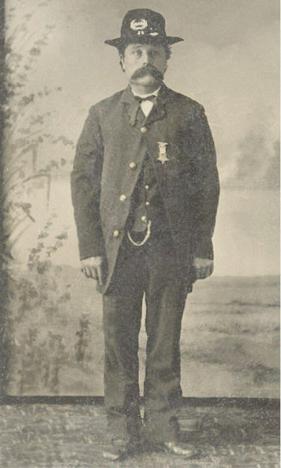John David Gross
Sons of Union Veterans of the Civil War


John David Gross On July 27, 1852, 16 year-old Johann David Gross, together with his parents, Johann Peter and Anna Maria Gross, four younger brothers and one younger sister, left their home in Miehlen in the Duchy of Nassau, Germany and traveled to the port of Antwerp, Belgium. On August 27, he celebrated his 17th birthday aboard the Caroline and Mary Clark bound for America. On September 21, the Gross family - including Johann Peter's brother Johann David Gross and his family - set foot on American soil at the bustling port of New Orleans, Louisiana. Both families settled in Marion County, Missouri. On April 8, 1857, John D. Gross married Henrietta Ellis Ketzler in Adams County, Illinois. By 1860, the couple was living in Palmyra, Missouri and had two children, Frederick D. Gross and Julia A. Gross.
Why a skilled wagon maker with a loving wife and two young children who had only been in America for a short nine years would join the Union Army remains a mystery. But on August 20, 1861 in Clayton, Illinois, John D. Gross enlisted in Company B of the 50th Regiment Illinois Volunteer Infantry together with his brothers-in-law, George and Lorenzo Ketzler. In 1862 at Corinth, Mississippi, Private Gross won a prize offered by Lt. Colonel Swartzout for being the "cleanest and best soldier in every way in the regiment." For most of 1863 he served on "absent" duty with the Engineer Corps and Pioneer Corps at Corinth, Mississippi. He re-enlisted on December 28, 1863 at Lynnville, Tennessee and spent part of 1864 assigned to the Quartermaster Department in Rome, Georgia. He was mustered out on July 13, 1865 in Louisville, Kentucky after 47 months of distinguished service.
In a sworn affidavit concerning a disability pension application for his brother-in-law, Lorenzo Ketzler, he wrote, "Lorenzo Ketzler was my messmate from August 1861 to July 22, 1865 and he was a number one soldier. He often complaint [sic] to me that Fort Donalson [sic] done him for the rest of his life. We were together with Grant and with Sherman to the see [sic] and in fact all the Northern Army went through."
Like his brother-in-law, he also carried a physical burden with him for those 47 months. One week after he enlisted, he was chopping wood at Camp Woods in Quincy, Illinois. A limb of a tree he was cutting flew up and struck him across his face severely breaking his nose. He was treated at Hospital No. 2 in Quincy but the effect of that injury plagued him for the rest of his life and contributed to his spending many of his last years as a resident of the Soldiers and Sailors Home in Quincy, Illinois; a victim of severe catarrh and related digestive disorders.
His lasting legacy is measured not only by his Civil War service, but also by his musical gifts. From the History of Brown County, 1880-1970, "Bands: The Silver Tone Band, directed by David Gross led the parades, gave concerts at the Brown County Fair, Fourth of July Celebrations and picnics during the 1880's and 1890's. Orchestras: David Gross, a wagon maker, was well grounded in music and an expert performer and teacher. Besides leading the band, he gave instructions in strings and brass instruments. His students formed orchestras to play for public gatherings." His wife, Henrietta, was a distinguished piano teacher in Clayton.
His oldest son, Frederick D. Gross, was a musician, composer, and music teacher in Clayton who enlisted in the 5th Regiment U.S. Army Cavalry in 1881 becoming its Bandmaster in 1883. He served on the American frontier, primarily at Fort Reno in the Oklahoma Territory, during the Indian Wars and the Oklahoma land rush. In 1898, he was transferred to the 10th Regiment U.S. Infantry as its Bandmaster and served in the Spanish-American War in both Cuba and the Philippines. He died in 1906 of a brain tumor and is buried at Fort Lawton in Seattle, Washington.
His youngest son, George W. Gross, joined his older brother in the 5th Regiment U.S. Cavalry Band in 1886 but returned to civilian life in 1894 to pursue a professional musical career. In 1895, he became only the third Bandmaster of the Texas AMC Band, which today is the legendary "Fightin' Texas Aggie Band." His musical career was tragically cut short when he was killed in a water tower accident (his "day job" was as a painter) in St. Louis just one day after his 31st birthday in 1900 and one week before he was to assume the leadership of a major musical organization in St. Louis. He is buried at Riverview Cemetery in Louisiana, Missouri.
John D. Gross died at his daughter's, Julia Little's, home in Alexander in Morgan County, Illinois on November 14, 1912. His wife, Henrietta, sons, Frederick and George, and daughter, Alberta Meyer, preceded him in death. His other daughters, Hettie Carlton, Amelia Boehm, and Lula Dempster, also survived him.
From the Clayton [Illinois] Enterprise, "The service was attended by a church full of people including his comrades of the local Grand Army post [R. K. McCoy Post No. 311]. The Mt. Sterling Orchestra, composed of pupils of Prof. Gross of other years, including his grandson, rendered music including the processional and recessional. After the service, the procession was formed and the body taken to the South Side (cemetery) where the Grand Army ritual was read, taps sounded, and the body was laid away peacefully in a bower of flowers."
Photograph and information submitted by John David Gross' great great grandson, Donald James Gross.
John David Gross


